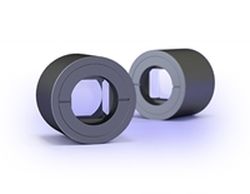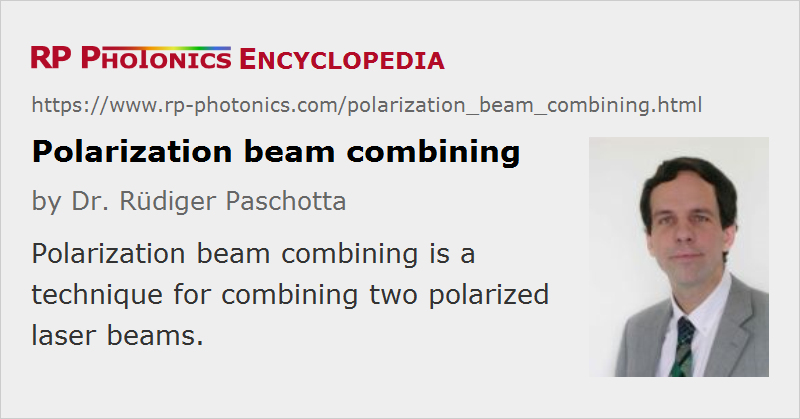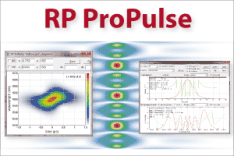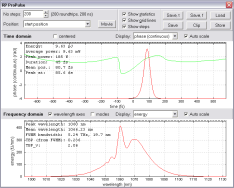Polarization Beam Combining
Definition: a technique for combining two polarized laser beams
More general term: beam combining
Categories: general optics, methods
How to cite the article; suggest additional literature
Author: Dr. Rüdiger Paschotta
Polarization beam combining (or polarization coupling) is a technique for combining (superimposing) two linearly polarized laser beams.
Incoherent Polarization Combining
The simpler variant is incoherent combining. For example, the output beams of two broad area laser diodes, one being vertically polarized and the other one horizontally polarized, can be sent onto a thin-film polarizer such that one of the beams is reflected, the other one transmitted, and both beams then propagate in the same direction. As a result, one obtains an unpolarized beam having the combined optical power of the input beams (neglecting some parasitic losses) and the same beam quality. Accordingly, the brightness is nearly doubled.
This technique is often used e.g. for end pumping of a solid-state laser with an increased power. It works only if the laser crystal can similarly well absorb pump radiation with both polarization directions. This is the case e.g. for Nd:YAG, but not for Nd:YVO4.
Incoherent polarization beam combining can not be considered as a method for power scaling, as it is not repeatable: it requires polarized input beams and leads to an unpolarized output beam.
Coherent Polarization Combining
If two mutually coherent beams are polarization combined, it is possible to obtain a linear polarization state for the output. Assuming equal input powers for the two ports, the output polarization will be rotated by 45° with respect to the polarization direction of any of the input beams. The method is one variant of coherent beam combining.
Due to the linear output polarization, coherent polarization combining can be repeated many times. It is thus a technique suitable for power scaling.
Suppliers
The RP Photonics Buyer's Guide contains 15 suppliers for polarization beam combining optics. Among them:


Edmund Optics
Edmund Optics offers a wide range of dichroic, crystalline, and wire grid polarizers which can also be used for polarization beam combining.
Questions and Comments from Users
Here you can submit questions and comments. As far as they get accepted by the author, they will appear above this paragraph together with the author’s answer. The author will decide on acceptance based on certain criteria. Essentially, the issue must be of sufficiently broad interest.
Please do not enter personal data here; we would otherwise delete it soon. (See also our privacy declaration.) If you wish to receive personal feedback or consultancy from the author, please contact him e.g. via e-mail.
By submitting the information, you give your consent to the potential publication of your inputs on our website according to our rules. (If you later retract your consent, we will delete those inputs.) As your inputs are first reviewed by the author, they may be published with some delay.
See also: beam combining, coherent beam combining, brightness, polarization of light
and other articles in the categories general optics, methods
 |





If you like this page, please share the link with your friends and colleagues, e.g. via social media:
These sharing buttons are implemented in a privacy-friendly way!